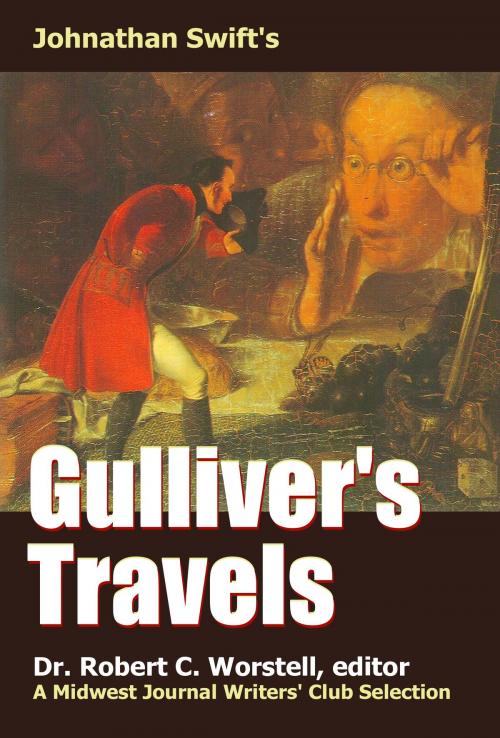Johnathan Swift's Gulliver's Travels
A Midwest Journal Writers Club Selection
Nonfiction, Entertainment, Humour & Comedy, General Humour, Fiction & Literature, Classics, Historical| Author: | Midwest Journal Writers' Club, Dr. Robert C. Worstell, Johnathan Swift | ISBN: | 9781304231314 |
| Publisher: | Midwest Journal Press | Publication: | July 15, 2013 |
| Imprint: | Language: | English |
| Author: | Midwest Journal Writers' Club, Dr. Robert C. Worstell, Johnathan Swift |
| ISBN: | 9781304231314 |
| Publisher: | Midwest Journal Press |
| Publication: | July 15, 2013 |
| Imprint: | |
| Language: | English |
About this book:
Travels into Several Remote Nations of the World. In Four Parts. By Lemuel Gulliver, First a Surgeon, and then a Captain of Several Ships, better known simply as Gulliver's Travels (1726, amended 1735), is a novel by Anglo-Irish writer and clergyman Jonathan Swift, that is both a satire on human nature and a parody of the "travelers' tales" literary sub-genre. It is Swift's best known full-length work, and a classic of English literature.
The book became popular as soon as it was published. John Gay wrote in a 1726 letter to Swift that "It is universally read, from the cabinet council to the nursery."
During his first voyage, Gulliver is washed ashore after a shipwreck and finds himself a prisoner of a race of tiny people, less than 6 inches tall, who are inhabitants of the island country of Lilliput. After giving assurances of his good behavior, he is given a residence in Lilliput and becomes a favorite of the court. From there, the book follows Gulliver's observations on the Court of Lilliput. He is also given the permission to roam around the city on a condition that he must not harm their subjects. Gulliver assists the Lilliputians to subdue their neighbors, the Blefuscudians, by stealing their fleet. However, he refuses to reduce the island nation of Blefuscu to a province of Lilliput, displeasing the King and the court. Gulliver is charged with treason for, among other "crimes", "making water" in the capital (even though he was putting out a fire and saving countless lives.) He is convicted and sentenced to be blinded, but with the assistance of a kind friend, he escapes to Blefuscu...
(source: Wikipedia)
About the author:
Jonathan Swift (30 November 1667 – 19 October 1745) was an Anglo-Irish satirist, essayist, political pamphleteer (first for the Whigs, then for the Tories), poet and cleric who became Dean of St Patrick's Cathedral, Dublin.
He is remembered for works such as Gulliver's Travels, A Modest Proposal, A Journal to Stella, Drapier's Letters, The Battle of the Books, An Argument Against Abolishing Christianity, and A Tale of a Tub. Swift is probably the foremost prose satirist in the English language, and is less well known for his poetry.
(source: Wikipedia)
About the Midwest Journal Writers' Club:
This was created by popular request to enable any beginning or established author to improve their skills by studying quality editions of classic bestselling fiction. Join at http://midwestjournalpress.com
About this book:
Travels into Several Remote Nations of the World. In Four Parts. By Lemuel Gulliver, First a Surgeon, and then a Captain of Several Ships, better known simply as Gulliver's Travels (1726, amended 1735), is a novel by Anglo-Irish writer and clergyman Jonathan Swift, that is both a satire on human nature and a parody of the "travelers' tales" literary sub-genre. It is Swift's best known full-length work, and a classic of English literature.
The book became popular as soon as it was published. John Gay wrote in a 1726 letter to Swift that "It is universally read, from the cabinet council to the nursery."
During his first voyage, Gulliver is washed ashore after a shipwreck and finds himself a prisoner of a race of tiny people, less than 6 inches tall, who are inhabitants of the island country of Lilliput. After giving assurances of his good behavior, he is given a residence in Lilliput and becomes a favorite of the court. From there, the book follows Gulliver's observations on the Court of Lilliput. He is also given the permission to roam around the city on a condition that he must not harm their subjects. Gulliver assists the Lilliputians to subdue their neighbors, the Blefuscudians, by stealing their fleet. However, he refuses to reduce the island nation of Blefuscu to a province of Lilliput, displeasing the King and the court. Gulliver is charged with treason for, among other "crimes", "making water" in the capital (even though he was putting out a fire and saving countless lives.) He is convicted and sentenced to be blinded, but with the assistance of a kind friend, he escapes to Blefuscu...
(source: Wikipedia)
About the author:
Jonathan Swift (30 November 1667 – 19 October 1745) was an Anglo-Irish satirist, essayist, political pamphleteer (first for the Whigs, then for the Tories), poet and cleric who became Dean of St Patrick's Cathedral, Dublin.
He is remembered for works such as Gulliver's Travels, A Modest Proposal, A Journal to Stella, Drapier's Letters, The Battle of the Books, An Argument Against Abolishing Christianity, and A Tale of a Tub. Swift is probably the foremost prose satirist in the English language, and is less well known for his poetry.
(source: Wikipedia)
About the Midwest Journal Writers' Club:
This was created by popular request to enable any beginning or established author to improve their skills by studying quality editions of classic bestselling fiction. Join at http://midwestjournalpress.com















